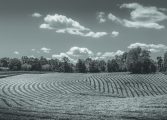By Page H. Gifford
Correspondent
Mary Alice Hostetter will speak to Friends of the Library about her two published works on Nov. 1 at 10 a.m.
An essayist, fiction and non-fiction writer, Hostetter is a fellow at the Virginia Center for the Creative Arts and her career has been in education and human services.
Hostetter’s book The Measure of a Life: Diaries of a Mennonite Farm Wife 1920-2000, explores her mother’s life through her diaries beginning at age 15. Hostetter inherited her mother’s dedication to writing yet it was not a window into her mother’s innermost thoughts but a look into how her mother’s generation lived. She recalled, growing up, and seeing her mother taking a moment out of her busy day to sit at a desk and record the day’s events.
“She noted the ever-changing price of eggs, the cost of shoes, and how many souls were saved at revival,” said Hostetter.
Growing up one of ten children, on a large farm in Lancaster, Pennsylvania during the ‘50s and ‘60s, Hostetter witnessed some of what her mother saw and recorded. As a child, she never questioned the life she was living. As she grew into her teen years, she shifted her focus from her family and the Mennonite culture and religion to outside influences.
In her book Plain, a memoir in essays, she talks about her growing self-awareness, delineating between her mother’s stalwart devotion and her role in the Mennonite community to Hostetter’s journey of self-discovery. She comes to terms with the realization of being gay and defining her authentic self while struggling with her rigid religious upbringing in a Mennonite family. Not only was she an outsider with her family and community but with society. Yet her upbringing and religion remain part of her and a guiding force in her life.
It is an insider’s look at a culture few understand. Hostetter looks at it with a reflective eye, using simple yet serenely powerful writing to engage the reader. She subtly separates herself from the ingrained institutions of Mennonite life so she can find authenticity.
She explains how she and her gay brother had come out to the family.
“I had written the essay about how my gay brother and I decided to write coming out letters to my 95-year-old father, a bit fearful of how he might take the news, but needing to do it nonetheless.”
The essay, “Dear Dad: We’ve Been Gay for a Very Long Time,” was published by the New York Times and received positive responses including the one from a young Mennonite girl in Lancaster County, Pennsylvania, where she grew up.
“The church was then in a bitter dispute about whether they would allow gay members and a self-righteous intolerance was splitting both the church and families apart,” she said.
She added, “I hope it came through in the book that peace and pacifism are important to Mennonites, and that’s a part I take with me. I also admire their beliefs about simple living and a sense of community. The more progressive group of Mennonites, those who are part of Mennonite Church, USA no longer have strict rules about dress and are increasingly tolerant of gay marriage and gay clergy,” she said. “The more conservative group, the group my parents would be a part of if they were still alive, still rigidly adhere to more traditional practices. There are many things about Mennonites that I respect but If I was growing up in the current more tolerant Mennonite church, I wonder if I’d have any reason to leave or been so intent on escaping.”
For more information, contact the Fluvanna County Public Library at 434-589-1400.




